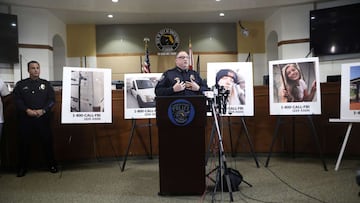How many people are missing in the US? The states with the most disappearances
Hundreds of thousands of people go missing in the United States each year. Most are eventually found, but sadly, a large group remain unaccounted for.

According to the US Department of Justice’s National Missing and Unidentified Persons System, there are 22,740 missing people in the United States.
With a few notable exceptions, the states with the highest reports of missing people are those with the largest populations. California (3,213), Texas (2,299), and Florida (1,650) are the three most populous states and have the highest number of missing persons. Alaska ranks fourth, with 1,218 missing persons, followed by New York with 1,064.
States where missing persons are more common
Alaska, which happens to be the third least populated state, has 1,218 missing persons cases currently open. By far and away, the rate of missing people, 41 in 100,000 residents, is nearly three times as high as in any other state. Indigenous people comprise around 21.9 percent of the population but over a quarter of missing person cases. The numbers of native men are much higher than native women, a trend that carries over across all ethnic and racial groups. Researchers who have looked into why the rates of missing people are so much higher in the country’s most northern state blame the hostile environment and not criminal abductions.
Arizona, the fourteenth largest US state, has recorded 1,051 cases of missing people. Hispanic and Latino residents of Arizona make up less than a third of the state’s population, but forty-eight percent of people missing. Additionally, women are overrepresented, making up over sixty percent of missing person cases. Children make up a little over ten percent of cases.
Oklahoma, the twenty-eighth largest state, ranked fifth in the number of missing persons. There are currently 770 open cases and the second-highest incidence of indigenous people who go missing. Native activists have raised concerns that many women who is reported missing are not correctly identified as indigenous, which makes it more difficult for law enforcement to follow possible leads. Black Oklahomans are also much likelier than white residents to go missing, as the former group makes up less than ten percent of the state’s population but almost a quarter of missing persons reports. Unlike Arizona, men are more likely to go missing in Oklahoma. Breaking cases down by age, missing children make up a staggering 43.8 percent of all reports.
Discrepancies in effort and resources by law enforcement among missing people.
The cases from Alaska, Arizona, and Oklahoma help to shed light on how racial and ethnic minorities are overrepresented in cases involving a missing person.
After the tragic death of Gabby Petito, who had first been reported missing, many racial justice activists applauded the efforts made by law enforcement to find her. However, they also pointed to the discrepancies in resources to locate a young white woman, with those typically deployed to search for women of color. A local ABC affiliate reported that the City of North Port, Florida spent $100,000 paying officers working on the case before it was handed over to the FBI. The FBI has not released any details on how much was spent on this case.
The inequalities in treatment from law enforcement and the media are an example of how systematic racism. The disregard shown to cases involving Black and indigenous women, in particular, are an alarming manifestation of white supremacy and the added protections ‘white-ness’ and proximity to it provide to some groups. Interwoven into the racial inequities are economic factors that make being reported missing more likely for some groups, like experiencing homelessness or losing a job.






